Clarinetists Sabine Meyer
and Reiner Wehle
A Conversation with Bruce Duffie
As anyone who has read some of these interviews knows, it has always
been a great joy for me to meet and speak with my guests, and then present
their ideas on the radio, and now on my website. Working with the
sound or the text is a privilege, and it is gratifying to know that the
end-product is appreciated by both the artists themselves, and the public
around the globe.
Once in
awhile, however, something happens which saddens the whole procedure,
and it was with shock and dismay that I learned of the death of Wolfgang
Meyer while preparing this interview with his sister Sabine and her husband,
Reiner Wehle. I had not met Wolfgang, but he was such an integral
part of Sabine’s life
that one cannot help but mourn him with her. The three are shown
on the LP jacket below-right.
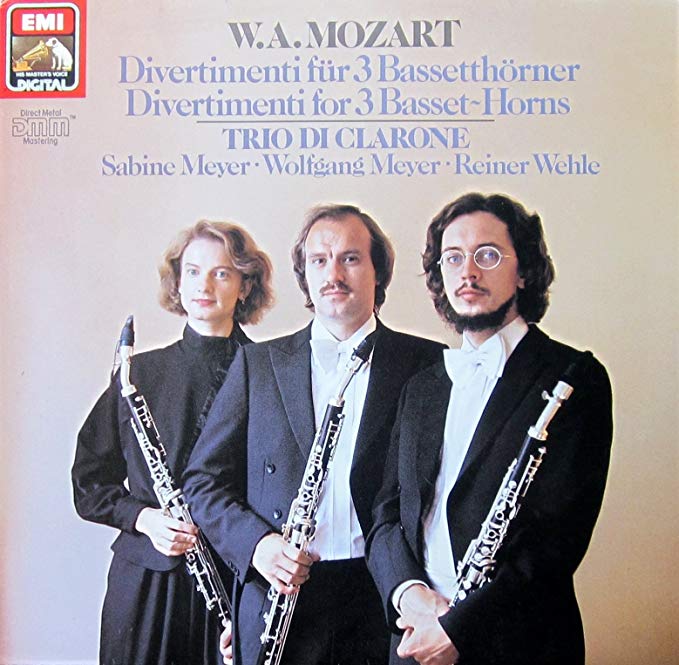 That said, let us now go back to Mid-July of 1994,
when Sabine was in Highland Park, Illinois, to play the Weber Clarinet
Concerto #1 with the Chicago Symphony Orchestra, led by Semyon Bychkov, at their
summer home, the Ravinia Festival. [Names which are links on
this webpage refer to my interviews elsewhere on this website.] This
was one of my familiar ‘half-concerts’,
where I would attend the first half, and then go backstage to interview
the soloist during the second half!
That said, let us now go back to Mid-July of 1994,
when Sabine was in Highland Park, Illinois, to play the Weber Clarinet
Concerto #1 with the Chicago Symphony Orchestra, led by Semyon Bychkov, at their
summer home, the Ravinia Festival. [Names which are links on
this webpage refer to my interviews elsewhere on this website.] This
was one of my familiar ‘half-concerts’,
where I would attend the first half, and then go backstage to interview
the soloist during the second half!
Unbeknownst to me when arranging the interview, Sabina’s
husband, Reiner, would be with her for the conversation. This
was fortunate, both for his knowledge and insight into the instrument
itself, but also for his ability to render their thoughts into more solid
English. So, when reading this transcript, watch the names to know
who is speaking. He did help her with the translation quite often,
but I have tried to keep each one’s thoughts together.
Having played bassoon (and later contrabassoon) throughout high school,
college, and graduate school, I had a special empathy for other reed-players.
Indeed, we had a lengthy discussion about reeds in the midst of the
musical ideas! Besides the serious talk of music and its related
ideas, there was much humor, and we all laughed many times during the discussion.
Co-incidentally, they were also about to participate in
Clarinet-Fest 94, sponsored by the International Clarinet Association. Because
of the conjunction of these two events, the audience for the CSO concert
had an abundance of clarinet players, to which we referred as we began
our conversation . . . . . . .
Bruce Duffie: Thank you for coming to Chicago.
Sabine Meyer: Yes, I’m happy to be here.
BD: Is it special to play in front of an audience
that has a lot of clarinetists?
Sabine: I didn’t know it before we came that
this would be such. But it’s good.
BD: Is there something special that clarinetists
will understand more about your playing?
Sabine: I think so, yes. They know all
the special problems of clarinet playing.
BD: [To her husband] You are also a clarinetist?
Reiner Wehle: Yes, I’m the husband, and also a clarinet
player.
BD: Is it good to have two clarinet players
together?
Sabine: Yes, it’s very good.
Reiner: Sometimes it’s very good!
Sabine: We don’t have problems.
Reiner: It’s an addition for two clarinet players.
I can understand what she does, and so I think it’s good for us.
Sabine: It’s nice. It’s not a conflict.
BD: You say that a clarinetist would understand
the special problems. Should the audience know about these special
problems, or should they just listen to the music?
Sabine: For the public, the important thing
is that they just listen, and hear, and enjoy, and feel. There
must be unity between player and the audience. There must be a bridge.
The other problems are the technical ones which we speak about with
other clarinet players. They listen to the technical problems.
They will say, “Now comes the bar that’s very difficult.”
That’s not so good. You should listen to the music and not hear
the technical problems, only the music. So, it’s better to have
a normal audience, and not a special clarinet-player audience.
BD: You mention a bridge between the musicians
and the public. Are you crossing the bridge, or are you bringing
them across the bridge to you?
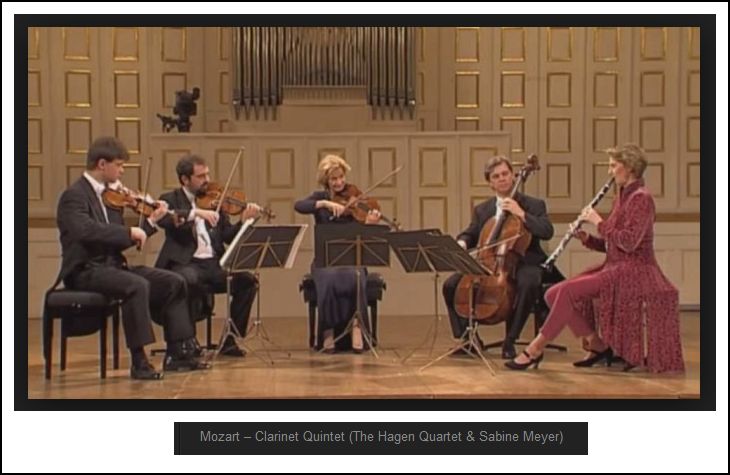
Sabine: The problem for me is the reaction from
the public. From the first moment when you come in, I notice how
the atmosphere is in the hall. I need it. I play much better
with an audience than on my records. I’m not so happy with my records.
I need the public, I need the reaction, and I let the important thing
be the music. This is what the music needs, not like this microphone
[pointing to the one between us on the table].
BD: Do you adjust your playing for the microphone,
for the record?
Sabine: No, I don’t change my playing, but
I play for the orchestra, or for the conductor. Also, there’s a
little difference between a big audience and a small one. But I try
to play all the time as best as I can.
Reiner: Maybe it’s more perfect if you have a recording
session, but she thinks she plays much better in a public concert, and
I’m sure she does.
BD: It’s good after a concert to relax a little
bit. Do you want the audience to relax and enjoy the music, or
do you want them to concentrate and get very nuance?
Sabine: No! When the public is relaxed,
this is terrible. After dinner they come to the concert, and come
to sleep, or only to hear a little bit of music. You need the concentration
from the public. It’s important.
BD: In the music you play, how much is art
and how much is entertainment?
Sabine: [Laughs] Rossini is entertainment,
but Brahms, for example, is more spiritual, more exciting. It’s good
when you have both but you can’t have both always.
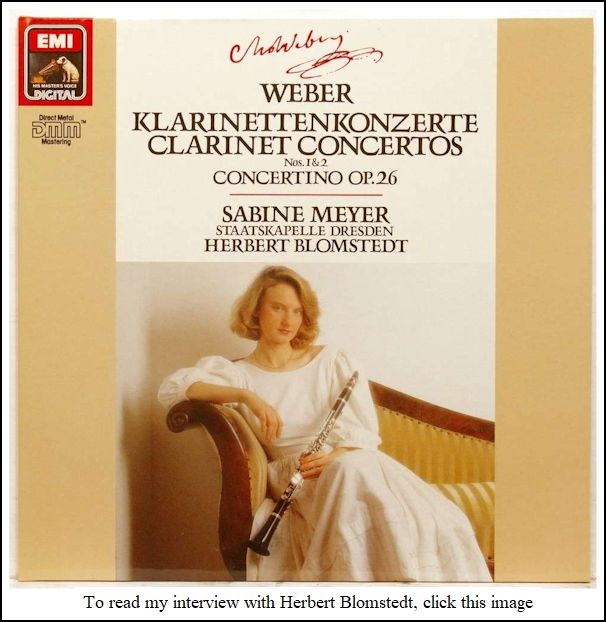 Reiner: It depends on the music you play.
There is some music which is entertainment, for example, Rossini.
It has nothing to do with the quality of the music. That’s the difference.
But there exists music which is entertainment, which wants to be entertainment,
like Rossini, or like some Mozart pieces, and there is some music, like
Bruckner, or Brahms which has nothing to do with entertainment.
It’s serious art, and you should play it so. You should enjoy it
in this way.
Reiner: It depends on the music you play.
There is some music which is entertainment, for example, Rossini.
It has nothing to do with the quality of the music. That’s the difference.
But there exists music which is entertainment, which wants to be entertainment,
like Rossini, or like some Mozart pieces, and there is some music, like
Bruckner, or Brahms which has nothing to do with entertainment.
It’s serious art, and you should play it so. You should enjoy it
in this way.
BD: Are there some pieces that have
some art and some entertainment blended together?
Reiner: Yes, of course.
Sabine: Mozart, Haydn. Haydn is more.
Reiner: Mozart once said, in a letter to his father,
that he wanted to compose the piano concertos in a very serious manner
for the people who understand music very much, and in a very light manner
for those who don’t understand music very much. He wanted to make
both concepts in one piece, and I think this is the best way.
* * *
* *
BD: From the clarinet literature,
how do you decide which pieces you’re going to play, and which pieces
you are not going to play? Or are you simply going to play all of
the clarinet literature?
Sabine: The clarinet literature is not as big
as the violin or the piano literature, so I can’t say I don’t like Weber,
but it’s terrible for a clarinet player.
BD: That’s three huge pieces gone! [All
laugh]
Sabine: Yes.
BD: Are you trying to expand the clarinet literature?
Sabine: Yes, we make very much modern music.
We go to the contemporary music, and we try to make good programs. We
also make interesting programs with not-so-famous composers, like Stamitz,
or Krommer. He wrote very, very well for woodwind players, and that’s
a good thing.
BD: Are the new composers, the contemporary composers,
writing well for the clarinet?
Reiner: It depends on which composer it is.
Sabine: Edison Denisov wrote an
octet for my wind ensemble, and we had an Italian tour with the wind ensemble,
and an Italian composer wrote a piece for the tour for us. We also
made a Japanese tour, and a Japanese composer wrote a piece, so I think
we have good pieces.
BD: When you ask a composer to write for you,
do you give him or her any specific idea, or do you just say, “Write
me a piece”?
Sabine: No, when they write me a
piece, we work together so he can ask us some things about our instrument.
For the ensemble, he might as if we want it with contra bassoon
or without, or a few other things about what we like or not like.
BD: Since that was my instrument, let me ask
that you always include a good contrabassoon part! [Much laughter
all around] You play the clarinet, the basset clarinet, and also
the bass clarinet?
Sabine: Yes.
BD: Would you encourage concertos for bass
clarinet?
Sabine: [Laughs] No, I would
never play a concerto for bass clarinet.
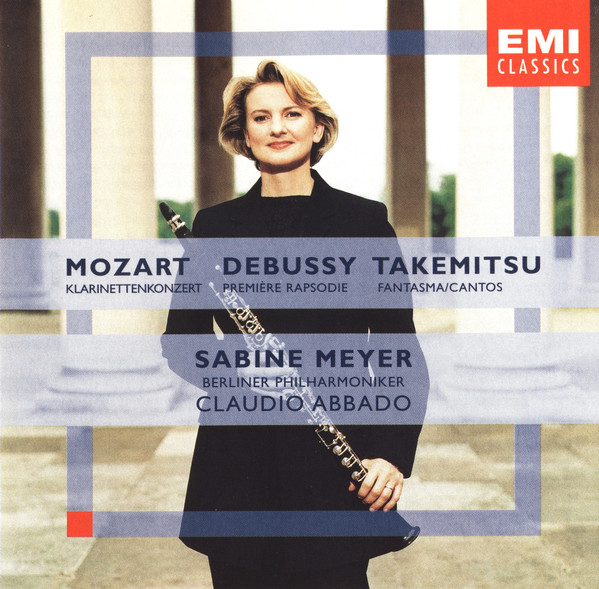 Reiner: She’s not a specialist in bass clarinet.
There are some people who are very, very famous for the bass clarinet,
like the Dutch clarinetist, Harry Sparnaay. He’s very famous on
the bass clarinet, and he plays only bass clarinet. But, that’s not
her job. Sometimes you have a piece where you have to use the bass
clarinet. For example, Schoenberg’s Pierrot Lunaire, where
you have to change between clarinet and bass clarinet, and that she does.
Reiner: She’s not a specialist in bass clarinet.
There are some people who are very, very famous for the bass clarinet,
like the Dutch clarinetist, Harry Sparnaay. He’s very famous on
the bass clarinet, and he plays only bass clarinet. But, that’s not
her job. Sometimes you have a piece where you have to use the bass
clarinet. For example, Schoenberg’s Pierrot Lunaire, where
you have to change between clarinet and bass clarinet, and that she does.
BD: Now, for instance, on the Mozart
Concerto, is there ever any reason not to use the basset clarinet?
Sabine: No, you have to use the basset
clarinet. That’s very important, and this is the original instrument
for this concerto. The problem exists for all clarinet players.
This is what Mozart wanted.
BD: So it’s wrong to use the standard clarinet?
Sabine: Yes. [Vis-à-vis
the recording shown at right, see my interviews with Tōru Takemitsu, and
Claudio Abbado.]
Reiner: You should imagine a pianist who plays a
Mozart concerto on a piano that has four tones missing. For the
Mozart Concerto, it’s impossible. No one would do it, even
though people did for nearly two hundred years.
BD: Are you glad that we’re back to having
the basset clarinets available and understood?
Sabine: Yes, sure.
Reiner: I don’t think anybody should play it on
a normal clarinet with orchestra, but students and music schools must
do it because it’s very expensive to buy a basset clarinet for only this
one piece. That’s the difficulty.
Sabine: The good thing is that more
and more conductors who want to play the Mozart Concerto say they
want it played on the basset clarinet. So, that’s a good direction.
BD: When you play a concerto, like you did
tonight, how much collaboration is there between you and the conductor?
Sabine: For the Weber Concerto, it’s
not so important. The Weber orchestral part is simple when it is
together. It is the solo clarinet which is more complicated than
the accompaniment.
Reiner: They only accompany the solo player.
It’s not so complicated.
Sabine: It is more important when you play
the Mozart Concerto. You need a good orchestra, you need
a conductor who makes everything, and is not thinking only about the
symphony which is coming after the intermission.
BD: Is all your work done at the rehearsal,
or do you leave something for the inspiration of the concert?
Sabine: I can’t do that. All the time
it comes from the moment. You can’t stay before the conductor as
he makes this here, and this here. Some things you have to do.
You have to rehearse it together with the orchestra, but many, many other
things come from the moment, and make the music.
BD: Now a piece like the Weber, which you just
performed, is one that you have played many, many times. If you’re
coming to a concert, do you start from scratch to relearn it, or do you
just simply bring it again and learn a little more each time?
Sabine: When it is good music you don’t have
to learn it all the time anew. But when you have good music, you
can create it anew with good music. The good music is my nourishment!
You can create it new and make new things.
Reiner: But you need music every day.
Sabine: Yes, but we need also holidays.
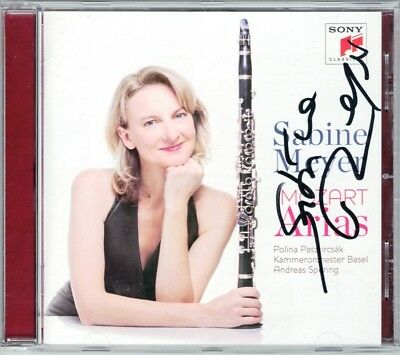 Reiner: Now we have two little children at
home, and we take holidays. But there were years where you didn’t
take one day’s holiday. She needed music! [All laugh]
Reiner: Now we have two little children at
home, and we take holidays. But there were years where you didn’t
take one day’s holiday. She needed music! [All laugh]
BD: It’s good that you both need music.
Sabine & Reiner: Yes, yes.
BD: Do your children need music yet?
Reiner: Yes, the little boy plays the piano.
He’s seven years old, and has lesson on the piano. Our daughter
is five years old. She wants to do it, but we say it’s too early.
Sabine: She can wait a little bit.
BD: Are you going to encourage them to get
into the business, or will you try and keep them out the business?
Reiner: That’s a big difference. They should
do music as they like music, and they want to do it, and we are happy that
they want to do it. But as a business, that’s a question which comes
much, much later.
Sabine: It’s difficult for children who have
famous parents. That’s very, very difficult for both of sides.
BD: Is it difficult for parents just to be
famous?
Sabine: No, but it is for the children.
The parents must be good musicians, and they must be so perfect as parents.
* * *
* *
BD: You play concertos, you play chamber music,
you play solo recitals. How do you divide your career amongst all
of those?
Sabine: I do those solo concertos with orchestra,
and chamber music. Both are important, and it divides nearly half
and half. I can play whatever I want, and not do things which have
no interest.
BD: It’s good to be in control and so that
you can decide.
Sabine: Yes. He (Reiner) has it under control.
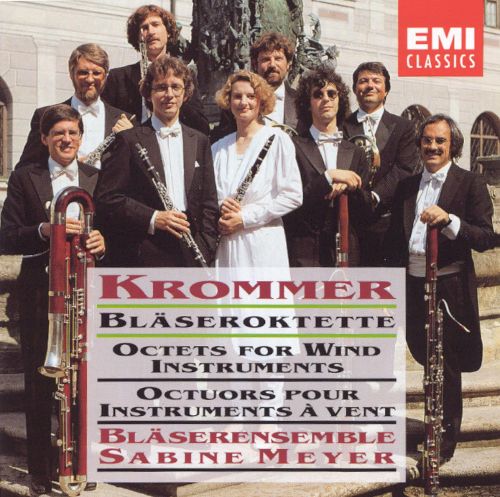 Reiner: I keep the diary and the schedule.
That’s very important. I think it must be a good balance between
both parts of the repertoire, because chamber music is maybe the more interesting
part. You have more time to work together, and to let the pieces grow.
You spend time with the other musicians, but on the other hand, the other
musicians, like in our wind octet, are friends of ours, our best friends.
That’s very, very nice to meet them every three months or so, and to do
things together. They are very, very interesting musicians, very
famous musicians. We take part in their lives, and their experience
of music, and the other part of the repertoire, away from the solo concerto.
With such long distance, it’s not so nice to be alone with the orchestra
and the conductor for one’s whole life, so chamber music is more a connection
with other people. With an orchestra, you come and have the rehearsal
the same day, and you leave tomorrow. It’s not so easy, but if you
have a conductor that you know very well, and you see him every year or
so, and you know he understands the music the same as you do, then it’s
good. But most of the solo concertos are with different conductors
you’ve never seen before, and will not see again afterwards. [He laughs]
Reiner: I keep the diary and the schedule.
That’s very important. I think it must be a good balance between
both parts of the repertoire, because chamber music is maybe the more interesting
part. You have more time to work together, and to let the pieces grow.
You spend time with the other musicians, but on the other hand, the other
musicians, like in our wind octet, are friends of ours, our best friends.
That’s very, very nice to meet them every three months or so, and to do
things together. They are very, very interesting musicians, very
famous musicians. We take part in their lives, and their experience
of music, and the other part of the repertoire, away from the solo concerto.
With such long distance, it’s not so nice to be alone with the orchestra
and the conductor for one’s whole life, so chamber music is more a connection
with other people. With an orchestra, you come and have the rehearsal
the same day, and you leave tomorrow. It’s not so easy, but if you
have a conductor that you know very well, and you see him every year or
so, and you know he understands the music the same as you do, then it’s
good. But most of the solo concertos are with different conductors
you’ve never seen before, and will not see again afterwards. [He laughs]
BD: Do you work with the conductor alone, or
do you wait to rehearse with the orchestra?
Sabine: We work together before the first rehearsal.
We have time on our own, about half an hour, and we speak about the
piece. I play a little bit of the difficult parts, and the important
parts for both, so that’s important.
BD: Do you adjust your technique of playing
for a small house or a large house, or outdoors?
Sabine: [With mock horror] Another technique???
I do need a special reed when I play the Nielsen Concerto, or when
I play the Mozart Concerto, so you need different materials, or
when you play chamber music, or sonatas with piano, you have to work a
little bit different with the material.
BD: So you have different reeds for each one?
Sabine: I have different reeds, yes.
But when you have a very, very good reed, so you can play all with the
one reed.
BD: How long does a reed like that last?
Sabine: Oh, my God! They’re all different
in their wood, which is hard or soft. Sometimes you have a reed you
can play for twenty concerts or more, and then you have a good reed that
you can play only one concert or two, and then it’s the end. [Laughs]
You can’t say how long a reed will last. It’s impossible.
BD: Have you ever have a reed die on you in
a concert, like when a violinist breaks a string?
Sabine: Yes!
Reiner: [Gently contradicting] It’s never happened
to her. It’s not like string which makes a ‘ping’ and it’s gone.
There’s no way it would go bad so quickly.
BD: It dies slowly?
Sabine & Reiner: Yes.
BD: So, you know when it’s starting to die?
Sabine & Reiner: Yes! [Laughter
all around] Sometimes it happens that it starts to die in the third
movement! That happens very often.
BD: Do you bring an extra reed or two with
you onto the platform?
Reiner: No, you finish the concert on this dying
reed! [More laughter]
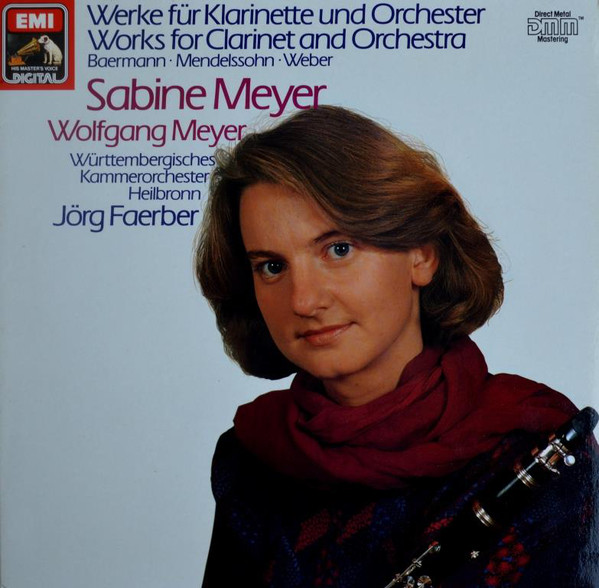 Sabine: You’re the only one who feels it yourself,
not the public. Sometimes, when I say, “It was possibly a bad reed,”
and Reiner was in the concert, he says “I can’t hear any problem.”
Sabine: You’re the only one who feels it yourself,
not the public. Sometimes, when I say, “It was possibly a bad reed,”
and Reiner was in the concert, he says “I can’t hear any problem.”
Reiner: She felt bad, and we didn’t hear it.
BD: Then do you adjust the embouchure and work
a little harder?
Sabine: Yes, but for me it’s very important to
have good material to feel good, and when I feel good, I can play better.
BD: Are the reeds you use ready-made, or do
you whittle on them a little bit?
Sabine: We make them all the time, but he’s
the important reed maker for me. He makes them from the beginning.
BD: [To Reiner] How long does it take
to work with a reed and get it so it’s just right for you... and is it
different to make it just right for her?
Reiner: No, we can use the same reeds.
We have nearly the same mouthpieces and need nearly the same reeds.
But with the reeds it’s continuous work. The reed is wood, and the
wood changes. It’s a question of humidity and other things.
Sabine: The reeds can be very different....
Reiner: Yes, from altitude, for example. So,
you have to change the reed every day a little bit.
BD: [Drawing from his own experience with double-reeds
for the bassoon] You can scrape a little bit off, but you can’t
put anything back.
Reiner: Yes, you can cut it a little bit. There’s
special instrument to cut it a little bit. Then it’s strong, and
you have to cut off a little bit. Then, if it was too much, then
you cut it again. It’s hard work.
BD: Do you start with the raw cane, or do you
start with a partially made reed?
Reiner: Both, but it’s better to start with the
cane, if you have the wood.
Sabine: We try, now, to make it from the beginning,
and we think this is the best way.
BD: [Facetiously] Grow your own trees!
[More laughter]
Sabine: In the garden! We could live
there.
Reiner: That’s the next step! Maybe we should
go to the south of France, live there, and make our own red wine. That
could be our hobby! [Still more laughter]
BD: How many reeds do you normally have when
you’re on tour? Do you bring ten reeds, a thousand reeds...?
Sabine: I have twelve. Six reeds are
ready, and one I can say is the one I can play for the concert. The
other ones you have to work on all the time.
BD: Do you work on them, also?
Sabine: Yes, I have to do it. He’s not
with me all the time.
Reiner: It’s not very difficult the problem, because
you must know what you have to do. You must play on your best reed.
The only difficulty is to find the best reed. One is the best,
and every evening it’s the same — find the
one which is the best.
BD: But it’ll be different each time?
Reiner: Yes, and you must find it, you must find
it! [Gales of laughter] If I am with her, I can help her find
it.
Sabine: It is a bit difficult. I am a little bit
nervous, and your approach or embouchure can be different. What
shall I bring? I try this, I try this, and it changes all the time.
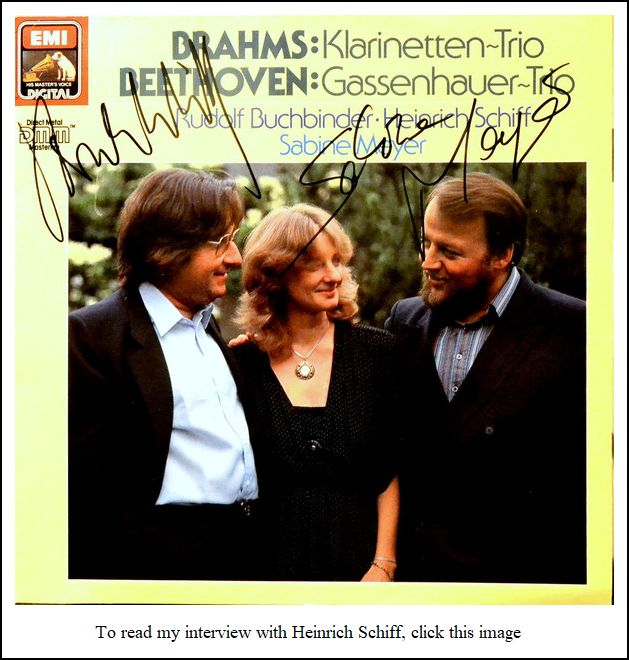 Reiner: It is clear when it doesn’t work!
Reiner: It is clear when it doesn’t work!
Sabine: I don’t know which one is the best!
[Laughs]
BD: Sometimes they’re all very close to being
the best?
Sabine: Yes.
Reiner: So, it’s very good if I am there. I’d
say it sounds great, you should take this one. Like today, it was
good, but she’s still not sure.
BD: [Re-assuringly] Oh, it sounded fine!
Sabine: It was a new one. I played it
for the first time today, and my feeling was it would be better to take
the old one. It’s always difficult to play with a new reed.
BD: Can I assume that if there are any problems
working with the reed in the rehearsal, adjustments are made?
Sabine: When I play in the rehearsal, I use
different reeds.
Reiner: In the rehearsal, she tried three different reeds.
She tried them in the dressing room. You must try them in the room,
and listen to the sound, and then you can decide this is a little bit
too thin in tone, and this is better for such a big hall, and so on.
BD: But you didn’t rehearse on this one you used this
evening?
Sabine: No, I didn’t.
Reiner: It was brand new.
BD: I would think that’s dangerous.
Reiner: That’s dangerous, yes. It’s not very
often that she does that.
Sabine: It’s also dangerous to try anything shortly
before the concert on the reed.
Reiner: Before the concert, you are nervous and you make
mistakes.
BD: Even now, with so many concerts behind
you, you are still nervous before the concert starts?
Sabine: Yes.
BD: Is there anything you can do to get over
that, or must you simply just go ahead?
Sabine: I have a few things that I can do before
the concert to become calm.
BD: Does the nervousness evaporate when you
walk out, or when you begin playing?
Sabine: No, mostly I’m nervous before, but
on the stage it’s okay. I know I must play now. I have to
play. There is no way out!
Reiner: It’s more the waiting for the concert, which
is hard on the nerves.
Sabine: But always when I’m not nervous, the performance
is also a little bit poorer. It’s good just to be a little bit
nervous.
BD: Just a little tension?
Sabine: Just a little is good.
* * *
* *
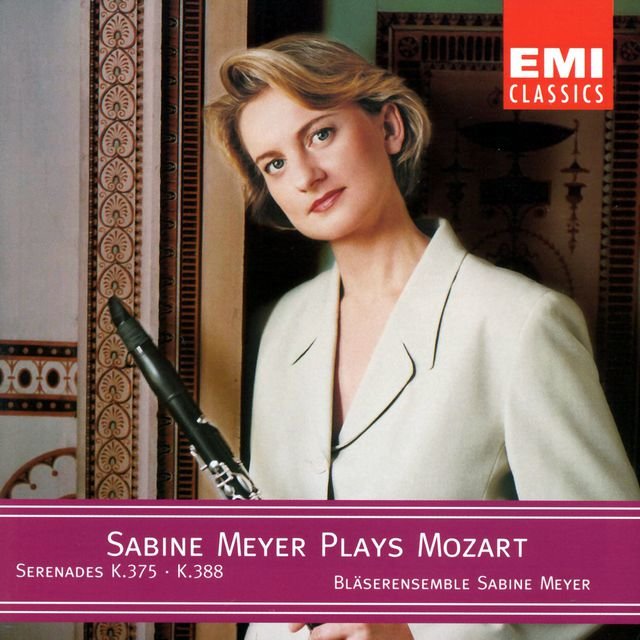 BD:
Let me ask you the big question. What is the purpose of music?
BD:
Let me ask you the big question. What is the purpose of music?
Sabine: [Thinks a moment] The purpose
is to express yourself. It’s important that you find what the composer
wanted. You have to play only the music.
Reiner: It’s very difficult to explain because there
are parts of you in what you are doing. But the important thing is
the composition.
Sabine: Yes, and only to play what is there.
Reiner: It’s the bigger part.
BD: I see. Just Mozart’s Mozart?
Sabine: Yes, just Mozart, and you have to find
his way, and find out what the composer wanted to say. It’s his
music.
BD: So you’re always digging more into the
music?
Sabine: Yes, you find all the time more things,
new things. You have to do this. You’re only the instrument
of the composer.
BD: Are you always playing the instrument,
or does the instrument become part of you?
Reiner: Yes, there are two things. She is
an instrument of the composer. She, with her instrument, the clarinet,
but the clarinet instrument mustn’t be between her and the music.
It must have unity, and she must sing with her instrument. She must
know the technical problems between her and the music, as if there was no
instrument in this sense.
BD: So the instrument becomes an extension
of her?
Reiner: Yes, of her, of course.
Sabine: When I see some musicians, I see the person,
and the instrument, and it’s two different things. When I play, they
must be together, the instrument and you.
Reiner: Like a singer.
Sabine: Yes.
Reiner: Like a singer-instrument, yes, the instrument
is a part of the performer.
BD: One last question. Is playing the clarinet
fun?
Sabine: [Big sigh] Yes! [Laughs] This
is my instrument! I like it, and it’s important for me, and it’s
my life. I don’t want to play the flute or any other instrument.
BD: [To both] Thank you so much for coming,
and for the conversation.
Sabine & Reiner: [They laugh] Thank
you so much. We are looking forward to the Clarinet Festival coming
up on Sunday morning.
BD: Lots of adoring fans!
Sabine: Yes! [They burst out laughing]
All clarinet fans!
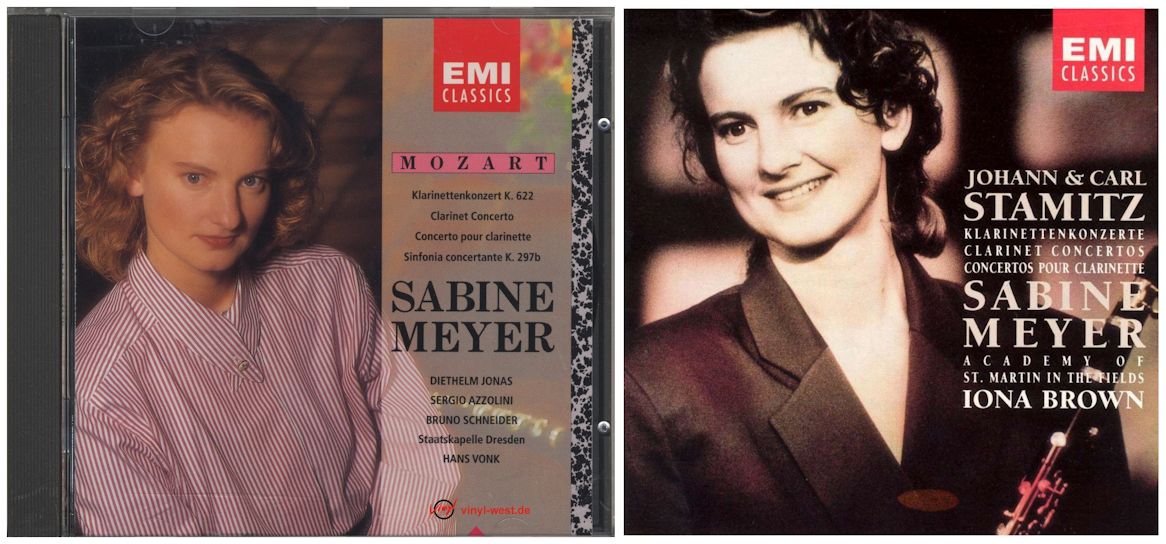
© 1994 Bruce Duffie
This conversation was recorded backstage at the Ravinia Festival
in Highland Park Illinois, on July 15, 1994. Portions were broadcast
on WNIB in 2001. This transcription was made in 2019,
and posted on this website at that time. My
thanks to British soprano Una Barry for
her help in preparing this website presentation.
To see a full list (with links) of interviews which have been transcribed
and posted on this website, click here. To
read my thoughts on editing these interviews
for print, as well as a few other interesting observations,
click here.
* * * *
*
Award -
winning broadcaster Bruce Duffie
was with WNIB,
Classical 97 in
Chicago from 1975 until its final moment
as a classical station in February
of 2001. His interviews have also appeared
in various magazines and journals since
1980, and he now continues his broadcast series on
WNUR-FM, as
well as on Contemporary
Classical Internet Radio.
You are invited to
visit his website
for more information
about his work, including selected transcripts
of other interviews, plus a
full list
of his guests. He would also like to call
your attention to the photos and information
about his
grandfather, who was a pioneer in the automotive
field more than a century ago.
You may also send him E-Mail with comments,
questions and suggestions.
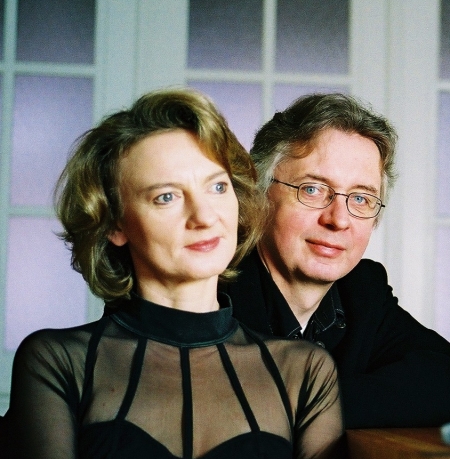

 That said, let us now go back to Mid-July of 1994,
when Sabine was in Highland Park, Illinois, to play the Weber Clarinet
Concerto #1 with the Chicago Symphony Orchestra, led by Semyon Bychkov, at their
summer home, the Ravinia Festival. [Names which are links on
this webpage refer to my interviews elsewhere on this website.] This
was one of my familiar ‘half-concerts’,
where I would attend the first half, and then go backstage to interview
the soloist during the second half!
That said, let us now go back to Mid-July of 1994,
when Sabine was in Highland Park, Illinois, to play the Weber Clarinet
Concerto #1 with the Chicago Symphony Orchestra, led by Semyon Bychkov, at their
summer home, the Ravinia Festival. [Names which are links on
this webpage refer to my interviews elsewhere on this website.] This
was one of my familiar ‘half-concerts’,
where I would attend the first half, and then go backstage to interview
the soloist during the second half!
 Reiner: It depends on the music you play.
There is some music which is entertainment, for example, Rossini.
It has nothing to do with the quality of the music. That’s the difference.
But there exists music which is entertainment, which wants to be entertainment,
like Rossini, or like some Mozart pieces, and there is some music, like
Bruckner, or Brahms which has nothing to do with entertainment.
It’s serious art, and you should play it so. You should enjoy it
in this way.
Reiner: It depends on the music you play.
There is some music which is entertainment, for example, Rossini.
It has nothing to do with the quality of the music. That’s the difference.
But there exists music which is entertainment, which wants to be entertainment,
like Rossini, or like some Mozart pieces, and there is some music, like
Bruckner, or Brahms which has nothing to do with entertainment.
It’s serious art, and you should play it so. You should enjoy it
in this way. Reiner: She’s not a specialist in bass clarinet.
There are some people who are very, very famous for the bass clarinet,
like the Dutch clarinetist, Harry Sparnaay. He’s very famous on
the bass clarinet, and he plays only bass clarinet. But, that’s not
her job. Sometimes you have a piece where you have to use the bass
clarinet. For example, Schoenberg’s Pierrot Lunaire, where
you have to change between clarinet and bass clarinet, and that she does.
Reiner: She’s not a specialist in bass clarinet.
There are some people who are very, very famous for the bass clarinet,
like the Dutch clarinetist, Harry Sparnaay. He’s very famous on
the bass clarinet, and he plays only bass clarinet. But, that’s not
her job. Sometimes you have a piece where you have to use the bass
clarinet. For example, Schoenberg’s Pierrot Lunaire, where
you have to change between clarinet and bass clarinet, and that she does. Reiner: Now we have two little children at
home, and we take holidays. But there were years where you didn’t
take one day’s holiday. She needed music! [All laugh]
Reiner: Now we have two little children at
home, and we take holidays. But there were years where you didn’t
take one day’s holiday. She needed music! [All laugh] Reiner: I keep the diary and the schedule.
That’s very important. I think it must be a good balance between
both parts of the repertoire, because chamber music is maybe the more interesting
part. You have more time to work together, and to let the pieces grow.
You spend time with the other musicians, but on the other hand, the other
musicians, like in our wind octet, are friends of ours, our best friends.
That’s very, very nice to meet them every three months or so, and to do
things together. They are very, very interesting musicians, very
famous musicians. We take part in their lives, and their experience
of music, and the other part of the repertoire, away from the solo concerto.
With such long distance, it’s not so nice to be alone with the orchestra
and the conductor for one’s whole life, so chamber music is more a connection
with other people. With an orchestra, you come and have the rehearsal
the same day, and you leave tomorrow. It’s not so easy, but if you
have a conductor that you know very well, and you see him every year or
so, and you know he understands the music the same as you do, then it’s
good. But most of the solo concertos are with different conductors
you’ve never seen before, and will not see again afterwards. [He laughs]
Reiner: I keep the diary and the schedule.
That’s very important. I think it must be a good balance between
both parts of the repertoire, because chamber music is maybe the more interesting
part. You have more time to work together, and to let the pieces grow.
You spend time with the other musicians, but on the other hand, the other
musicians, like in our wind octet, are friends of ours, our best friends.
That’s very, very nice to meet them every three months or so, and to do
things together. They are very, very interesting musicians, very
famous musicians. We take part in their lives, and their experience
of music, and the other part of the repertoire, away from the solo concerto.
With such long distance, it’s not so nice to be alone with the orchestra
and the conductor for one’s whole life, so chamber music is more a connection
with other people. With an orchestra, you come and have the rehearsal
the same day, and you leave tomorrow. It’s not so easy, but if you
have a conductor that you know very well, and you see him every year or
so, and you know he understands the music the same as you do, then it’s
good. But most of the solo concertos are with different conductors
you’ve never seen before, and will not see again afterwards. [He laughs] Sabine: You’re the only one who feels it yourself,
not the public. Sometimes, when I say, “It was possibly a bad reed,”
and Reiner was in the concert, he says “I can’t hear any problem.”
Sabine: You’re the only one who feels it yourself,
not the public. Sometimes, when I say, “It was possibly a bad reed,”
and Reiner was in the concert, he says “I can’t hear any problem.”
 Reiner: It is clear when it doesn’t work!
Reiner: It is clear when it doesn’t work! BD:
Let me ask you the big question. What is the purpose of music?
BD:
Let me ask you the big question. What is the purpose of music?